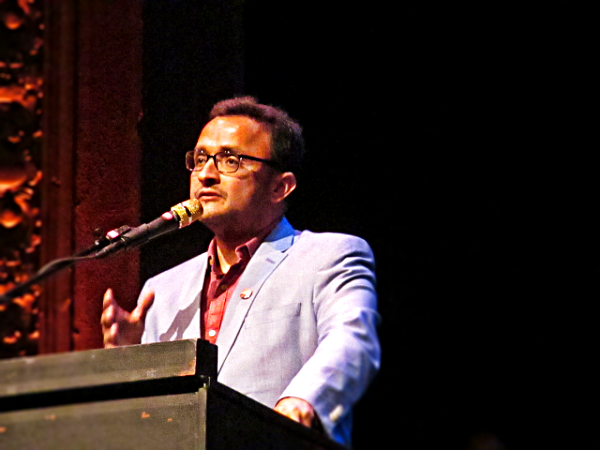The battle of the November ballot continues Tuesday as several key items left over from last week’s crazy Board of Supes meeting are back on the agenda.
Top of the list: The future of the public advocate measure and the Department of Police Accountability, which might be folded into the public advocate.

In a rather bitter and nasty fight last week, the supes by a 6-5 majority decided that instead of putting Sup. Malia Cohen’s police reform on the ballot by itself, they would fold it into the measure by Sup. David Campos that would create the public advocate.
The idea: As long as the mayor and the Police Commission control police oversight, it’s not going to be effective.
Cohen was furious – she doesn’t like the public advocate idea anyway, and tried to undermine it in committee. She doesn’t want her proposal connected in any way.
After she lost, at the very end of the meeting, Sup. London Breed asked that the vote against Cohen’s measure be rescinded, and the progressive majority agreed. So the whole package – a measure to reform the Office of Citizen Complaints and create a Department of Police Accountability, a measure to create the Office of Public Advocate, and a proposal to merge the two – will be back before the board.
There are pretty clearly six votes to put the public advocate measure on the ballot. Last week there were six votes to ensure that the director of the police oversight agency is appointed by the public advocate and that the two measure are merged.
There has been, I’m sure, furious lobbying by Breed and others to allow them to be voted on individually, which would leave the mayor in control of police oversight – something that no mayor in years has been good at.
Then there are the street trees. Everyone agrees on the problem: A few years ago, for reasons that aren’t clear (but must be about the budget), the Department of Public Works decided that it would no longer care for trees planted along the city’s streets, and started unilaterally transferring that responsibility to the nearest property owner.
In a lot of neighborhoods, this is a huge deal – particularly places like District 9 and District 11 where there are older people who have owned homes for many years and are living on modest incomes. The cost of maintaining the trees (and fixing the sidewalk where the roots cause damage every few years) is enough that a lot of them would just as soon cut the trees down and be done with it.
And many of them look around and say: This city is so full of money, so rich, why can’t DPW keep maintaining the trees, the way it did for about 50 years?
Everyone wants the city to take this back. Sup. Scott Wiener wants to pass a parcel tax to pay for it. Sup. John Avalos wants to pass a carbon tax to pay for it. Some of the supes are asking: Why can’t we just put this back in the DPW budget, where it always was?
Wiener asked that his measure be delayed a week because he didn’t have the votes. Don’t know what he’s been cooking up in the past few days but it’s back on the agenda Tuesday, and time is running out.
(BTW, What the Fuck Chuck Nevius made a point of saying that the progressives are all wrong (of course) and that last week’s meeting was nasty, and that Clerk Angela Cavillo had to step in. But he only mentions that she stepped in to stop the name-calling – he ignores that Board President London Breed, whom he supports, tried to shut down debate at one point and Cavillo had to step and remind her that when a supervisor asks to be recognized to make an amendment, the prez can’t just ignore that and refuse to recognize them.)
There’s also a proposed charter amendment to allow non-citizens to vote in local School Board elections and a measure that the mayor really doesn’t like to create a commission to oversee his offices of housing and economic development.
The non-citizen voting has come up before; I would be surprised if there aren’t six votes for it.
Peskin’s commission idea makes a lot of policy sense – in the past decade or so, the way that federal and state housing money is distributed has changed dramatically, and the demise of redevelopment agencies has changed things even more. These days, a lot of the planning and development action in the city takes place not at the Planning Department but in the Mayor’s Office of Housing. There’s no public input.
Wiener complained that with the proposal for a public advocate and the new commission, the progressives are trying to “dismantle” the Mayor’ Office. That’s a little bit of an overstatement, but he has a point: The progressives have been working for years now to shift some of the control of city government away from a very powerful chief exec. The mayor of San Francisco appoints either every member or a majority of the members of every key commission; oversees the budget (including the budgets of elected officials who don’t report to him); appoints dozens of key department heads; has the authority to unilaterally suspend most elected officials and can appoint their replacements; and the list goes on. And what happens in the Mayor’s Office typically happens in secret.
So trimming that power a bit isn’t such a radical concept.
There’s also an ordinance by Peskin and Sup. Jane Kim that would mandate conditional-use authorization for any project that destroys Production, Distribution and Repair space, which has been happening all over the city. It’s at the end of the agenda, and will be dwarfed by the debate over the ballot, but it’s a measure that would have lasting impacts.







